By Christina Helmick
Have you ever been working on a project, article or something else in the health-realm of things, and wanted to see how Waco stood against other cities? If so, you were met with the reality that health data is only available at the county level, until now. The Robert Wood Johnson Foundation, National Resource Network (NRN) and the NYU School of Medicine have piloted a joint venture of analysis and producing city-level health data.
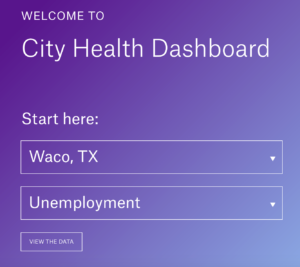 Waco, along with other cities across the nation, took part in a competitive application process to pilot this program. Accompanying Waco in this pilot program are three other cities: Flint, Michigan; Kansas City, Kansas; and Providence, Rhode Island. What is a common thread between us and the other three cities? We all face economic challenges and are working hard to improve the overall quality of life.
Waco, along with other cities across the nation, took part in a competitive application process to pilot this program. Accompanying Waco in this pilot program are three other cities: Flint, Michigan; Kansas City, Kansas; and Providence, Rhode Island. What is a common thread between us and the other three cities? We all face economic challenges and are working hard to improve the overall quality of life.
You can view the City Health Dashboard by clicking here.
Okay, so let’s look at a metric together. Click “Waco, TX” and are click “Unemployment.” What appears is a whole bunch of numbers and a visually pleasing map. What does that all mean?
Waco’s average for unemployment is 8.5%. Particularly useful, the dashboard also notes how far above or below the national average Waco sits. Waco’s unemployment rate is 3.5% above the national average of 5% — meaning Waco has more people seeking jobs and unable to find a job than the national average.
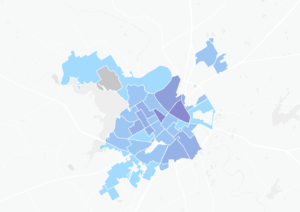 The map shows what parts of the city have higher rates of unemployment than others. A darker purple means higher unemployment and light blue means lower rates of unemployment. In our city, there are pockets of high and low unemployment rates—the lowest rate being 1.4% and the highest rate being 24.4%.
The map shows what parts of the city have higher rates of unemployment than others. A darker purple means higher unemployment and light blue means lower rates of unemployment. In our city, there are pockets of high and low unemployment rates—the lowest rate being 1.4% and the highest rate being 24.4%.
Also useful is the notation of the data source, years of collection and the definition of how the measure is calculated. When looking at unemployment, the data comes from the Census data using a 5-year estimate. The 5-year estimate means the data was collected between January 1, 2010, and December 31, 2014. The definition of unemployment is as follows: percent of the civilian population age ≥ 16 that is unemployed but actively seeking work.
Being able to have this disaggregated data allows our community to better target our efforts. So, by looking at the Unemployment data from the City Health Dashboard, we are able to connect the Waco Foundational Employment Network’s efforts to certain areas in our community. The city-level data can be passed to community partners, such as Skillpoint Alliance, to help them target recruitment efforts for their free rapid workforce training program. Or, to Goodwill Industries to promote their career fairs and the free job training classes they offer.
I know (first-hand) data can be intimidating and confusing, so don’t forget that the Prosper Waco team is here to help. Our director of data and research, Brittany, is a data guru and loves to help organizations and people better understand how to find data, understand data and (better yet) how to effectively use data. She can be reached by sending a quick email to Brittany@prosperwaco.org.
 Peruse the health dashboard to look at the 26 different measures. Is there one that sparks your interest? For me, it’s the walkability measure. Waco scored 34 out of 100. We can do better! One group in town that is working to improve walkability is Waco Walks. I’m adding their next meeting to my calendar so I can help be part of the solution of improving our community, one step at a time.
Peruse the health dashboard to look at the 26 different measures. Is there one that sparks your interest? For me, it’s the walkability measure. Waco scored 34 out of 100. We can do better! One group in town that is working to improve walkability is Waco Walks. I’m adding their next meeting to my calendar so I can help be part of the solution of improving our community, one step at a time.
 Christina Helmick is the director of communication at Prosper Waco. She is a recent graduate of Baylor University with a BA in Journalism, Public Relations & New Media. Originally she is from Washington, D.C., but has stayed in Waco post-graduation. She is an active mentor at J.H. Hines Elementary School, enjoys spending time with her family and watching Baylor football. Sic ’em Bears!
Christina Helmick is the director of communication at Prosper Waco. She is a recent graduate of Baylor University with a BA in Journalism, Public Relations & New Media. Originally she is from Washington, D.C., but has stayed in Waco post-graduation. She is an active mentor at J.H. Hines Elementary School, enjoys spending time with her family and watching Baylor football. Sic ’em Bears!
The Act Locally Waco blog publishes posts with a connection to these aspirations for Waco. If you are interested in writing for the Act Locally Waco Blog, please email ashleyt@actlocallywaco.org for more information.
(During December we will be reprising some of “2017’s greatest hits” from the Act Locally Waco blog. I couldn’t possibly pick my favorites – so I used the simple (cop out?) approach of pulling up the 10 blog posts that got the most “opens” according to our Google Analytics. It is an intriguing collection that gives at least a little insight into the interests and concerns of Act Locally Waco readers. I hope this “Top 10” idea inspires you to go back and re-read your personal favorites. There have been so many terrific ones… If you would like to see the Top 10 according to Google Analytics, here’s the link: 2017 Greatest Hits. Merry Christmas! — ABT)
By Stephanie Korteweg
When I used to think of the word “mentoring,” I used to get this instant mental image of a Big Brothers and Big Sister’s commercial. Almost immediately my next thought was, “I don’t have enough time, and what in the heck would I do if I became a mentor?” We all sometimes have this sort of knee jerk reaction to things that are out of our comfort zone. Think for a moment about a time when you did something that caused you a little fear, whether it was something adventurous like skydiving, or trying something new like a new job or becoming a parent. Sometimes the things that cause us insecurity and a little bit of fear are some of most intrinsically rewarding experiences that we talk about for years.
 Let me ask you a question… how did you learn the things you know today? What person taught you those things? Who taught you how to change a tire, write a resume, how shake hands. Who was there for you during a difficult time in your life? If you think about it long enough you will probably think of several people who helped you when you needed it. Maybe they gave you advice, or maybe their presence made you feel like you weren’t alone.
Let me ask you a question… how did you learn the things you know today? What person taught you those things? Who taught you how to change a tire, write a resume, how shake hands. Who was there for you during a difficult time in your life? If you think about it long enough you will probably think of several people who helped you when you needed it. Maybe they gave you advice, or maybe their presence made you feel like you weren’t alone.
I think the biggest barrier to becoming a mentor is the definition of “mentoring” we carry around in our heads. We need to put aside that old rigid framework–you know what I’m talking about. It’s the one that leaves you feeling overwhelmed before you begin. I think it’s time we start looking at what mentoring really is — an intentional investment in a person’s life, particularly a young person’s life.
And, what if I were to tell you that mentoring is one way we can help transform our community?
 I’ve been a part of a mentoring group called the Mentor Coalition for the past five years. As soon as I joined I realized that the mentoring opportunities here are as diverse as our community. We have organizations that require a relatively low time commitment and others with a substantial time commitment. There are mentoring organizations that focus on high school students, others that focus on elementary students. Some are highly structured programs, others are a lot more flexible in their structure. In the Mentor Coalition each organization does their part, working together like the gears in a bike, to see our community changed for the better.
I’ve been a part of a mentoring group called the Mentor Coalition for the past five years. As soon as I joined I realized that the mentoring opportunities here are as diverse as our community. We have organizations that require a relatively low time commitment and others with a substantial time commitment. There are mentoring organizations that focus on high school students, others that focus on elementary students. Some are highly structured programs, others are a lot more flexible in their structure. In the Mentor Coalition each organization does their part, working together like the gears in a bike, to see our community changed for the better.
A study from Child Trends called “Mentoring: A Promising Strategy for Youth Development,” showed that “overall, youth participating in mentoring relationships experience positive academic returns, better attendance, an improve chance of continuing on to higher education, and better attitude toward school.”
Another study, “The Consequences of Dropping Out of High School, Joblessness and Jailing for High School Dropouts and the High Costs for Taxpayers,” states “The incidence of institutionalization problems among young high school dropouts was more than 63 times higher than among young four-year college graduates.”
There’s a correlation between the success of the youth of our community and health of our community. I’m not just talking about the old Michael Jackson song here, but the children really are our future. They are the future entrepreneurs, doctors, teachers, social workers, police for our community.
Our American mentality looks for the quick fix. We are in the age of instant gratification, and we have forgotten about the simplicity of consistency, the power of a smile and the impact of an encouragement.
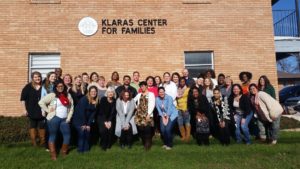 I was recently speaking with a truancy judge and she told me a story of a family that had been in to see her several times. By the third time she asked to see only the kids in her office. As she sat there with the kids, she pulled an alarm clock from her desk drawer. She gave it to the kids and showed them how to use it. I remember her telling me how inadequate that action felt to her and how she really wanted to do something more. I asked if she’d ever seen the kids back in her court. She paused, thought about it for a minute looked back at me and said, “actually, I haven’t seen them since.”
I was recently speaking with a truancy judge and she told me a story of a family that had been in to see her several times. By the third time she asked to see only the kids in her office. As she sat there with the kids, she pulled an alarm clock from her desk drawer. She gave it to the kids and showed them how to use it. I remember her telling me how inadequate that action felt to her and how she really wanted to do something more. I asked if she’d ever seen the kids back in her court. She paused, thought about it for a minute looked back at me and said, “actually, I haven’t seen them since.”
Don’t discount the small things. Don’t let the fear of the unknown keep you from investing in a kid’s life. Don’t believe the lie that your small investment won’t make an impact. Join more than 800 other individuals in our community who are making an impact by mentoring- go to our website and get involved!
 The Mentor Coalition is a group of representatives from mentoring agencies that serve young people in the Greater Waco area. These organizations work with local schools and families to provide necessary academic and social support to our area’s youth. The goal of the Coalition is to double the number of people who are currently mentoring in Waco to a total of 2,000 mentors! Please visit http://www.prosperwaco.org/mentor-coalition/ for more information on how to become a mentor.
The Mentor Coalition is a group of representatives from mentoring agencies that serve young people in the Greater Waco area. These organizations work with local schools and families to provide necessary academic and social support to our area’s youth. The goal of the Coalition is to double the number of people who are currently mentoring in Waco to a total of 2,000 mentors! Please visit http://www.prosperwaco.org/mentor-coalition/ for more information on how to become a mentor.
The Act Locally Waco blog publishes posts with a connection to these aspirations for Waco. If you are interested in writing for the Act Locally Waco Blog, please email ashleyt@actlocallywaco.org for more information.
By Liz Ligawa
So, I’m chuckling as I begin writing this piece. I am not sure if you have seen it, but a few months ago, a video clip offered some very necessary comic relief for me after a particularly difficult time finding the salve of sleep. The clip was “Trust Fall Fail”. If you are familiar with the team building activity of the Trust Fall, then you probably know where this is going. However, if your experience is not like mine, (filled with an abundance of Ropes Courses, or team building activities), I’ll briefly explain.
The Trust Fall is designed to strengthen teams by building trust among its members. In this activity, trust is demonstrated by choosing to fall into the supportive strength of team members. In the “Trust Fall Fail” video, however, this particular team member does not fall backward into the support of her team, but rather falls in the direction where her team is not: forward. You can imagine how this ends, and also maybe why it’s kind of funny. But I wonder if we exhibit this same misunderstanding sometimes- fall in the wrong direction. Do we believe the solutions to the challenges we face exist in the “next big thing” in front of us, or do we recognize the truth of the solution being among us?
One program coordinator who has tapped into the truth of solutions being among us is André Watkins. Mr. Watkins is 6’1”, and holds up a 300lb frame. He also holds up the Restorative Justice program at Waco High School. By simply observing his stature, it may be an easy assumption to think he uses his brawn to achieve results, or at the least, compliance. However, in observation of his steady demeanor, and measured approach, I discovered that neither intimidation, nor any other misuses of power, make it into his strategic toolkit. The asset Mr. Watkins and his team focus on is strong relationships. The tool he uses to promote strong relationships is trust.
Trust is an interesting tool, right? It is understandably not the first thing that comes to mind when thinking about ways to strengthen schools, or organizations, but don’t let its low profile fool you. Relational trust is a strong indicator of health in organizations, and teams (Costa, Roe, & Taillieu, 2001). A 10-year study of more than 400 Chicago area elementary schools explored the relationship between trust and student achievement, and was able to “establish a connection between the level of trust in a school and student learning,” (Bryk & Schneider, 2003). The Restorative Justice model of discipline is suitably positioned to contribute to strong relationships in learning environments because it employs practices which engender trust.
So, why is trust so important? Liz’s simple answer would be, “Because trust is a barometer for an organization’s climate, and it governs how we interact with one another.” However, the researchers’ response will do just fine: “Trust fosters a set of organizational conditions…that make it more conducive for individuals to initiate and sustain the kinds of activities necessary to affect productivity….While trust alone does not guarantee success, schools with little or no trust have almost no chance of improving,” (Bryk & Schneider, 2003).
The Restorative Justice model of discipline is in its third year at Waco High School. You might be wondering about the effectiveness of André Watkins and his Restorative Justice team, or at least if having this program on campus has contributed to improvement. Has this approach affected attendance, behavior, or academic scores in Waco High? Is there a measurable reduction in discipline referrals, suspensions, or alternative education placements? Has there been an increase in family engagement? To all of these, I answer, “Absolutely! And the supporting numbers are incredible.” So, why am I not satisfying your need for numbers? Well, because people are not numbers. Those involved with this program are the ones to offer the truest sense of its efficacy.
I hope I have encouraged enough curiosity in you to see how strong relationships promote strong schools, and organizations. My favorite part about this research, and the efforts of Restorative Justice is that it cuts through the limiting ways we think about poverty: “A positive climate mediates the relationship between student and school SES background characteristics,” (Berkowitz, Moore, Astor, & Benbenishty, 2016). But of course, André, and his team, have already figured this out. How is your climate?
 Elizabeth Ligawa is a recent graduate from Truett Theological Seminary, and the Diana R. Garland School of Social Work, earning both her Master of Divinity, and Master of Social Work. Though her prized role is being a mother to her dear son, Elijah, Liz has a love for encouraging people to come together in ways that engender healthy communities. Her role as the Director of Community Engagement at Prosper Waco allows her the room to work in and among the many faces of her beloved Waco community. She may be reached at liz@prosperwaco.org.
Elizabeth Ligawa is a recent graduate from Truett Theological Seminary, and the Diana R. Garland School of Social Work, earning both her Master of Divinity, and Master of Social Work. Though her prized role is being a mother to her dear son, Elijah, Liz has a love for encouraging people to come together in ways that engender healthy communities. Her role as the Director of Community Engagement at Prosper Waco allows her the room to work in and among the many faces of her beloved Waco community. She may be reached at liz@prosperwaco.org.
The Act Locally Waco blog publishes posts with a connection to these Aspirations for Waco. If you are interested in writing for the Act Locally Waco Blog, please email ashleyt@actlocallywaco.org for more information.
References
Berkowitz, R., Moore, H., Astor, R.A., & Benbenishty, R. (2016). A research synthesis of the associations between socio-economic background, inequality, school climate, and academic achievement. Review of Educational Research, 20(10), 1-45.
Bryk, A.S., & Schneider, B. (2003). Trust in schools: A core resource for school reform. Educational Leadership, 60(6), 40–45.
Costa, A.C., Roe, R.A., & Taillieu, T., (2001). Trust within teams: The relation with performance effectiveness. European Journal of Work and Organizational Psychology, 10(3).
By Christina Helmick
Every time I’m asked to give my feedback, a little voice in my head says, “what will you do with my feedback? Will it be used to inform the next steps?” I feel like so many have these same thoughts after being asked for feedback. And the skepticism is understandable. If feedback is constantly asked for, but not used to inform the work, then why would people keep giving feedback? This question was at the forefront of our minds when we created the discussion-based breakout sessions at the 2016 Prosper Waco Summit.
On Sept. 19, more than 500 community members came together at the Waco Convention Center from 4-8PM for the 2016 Summit. During the event, participants heard a brief overview of the initiative’s history, along with some of the efforts currently being implemented in the Waco community and what community partners are involved in those efforts. Following the opening session, participants were strategically placed in three different rooms to ensure cross-sector representation of Education, Health and Financial Security were at each table.
During the breakout sessions we asked participants to talk amongst their table, and then the larger room, about solutions our community can implement to address the community’s goals. We worked hard to compile the feedback from the different breakout rooms. You can click here to read all of the feedback compiled from the breakout sessions, and if you view the pictures below, you can see the solutions that were identified more than once throughout the rooms.
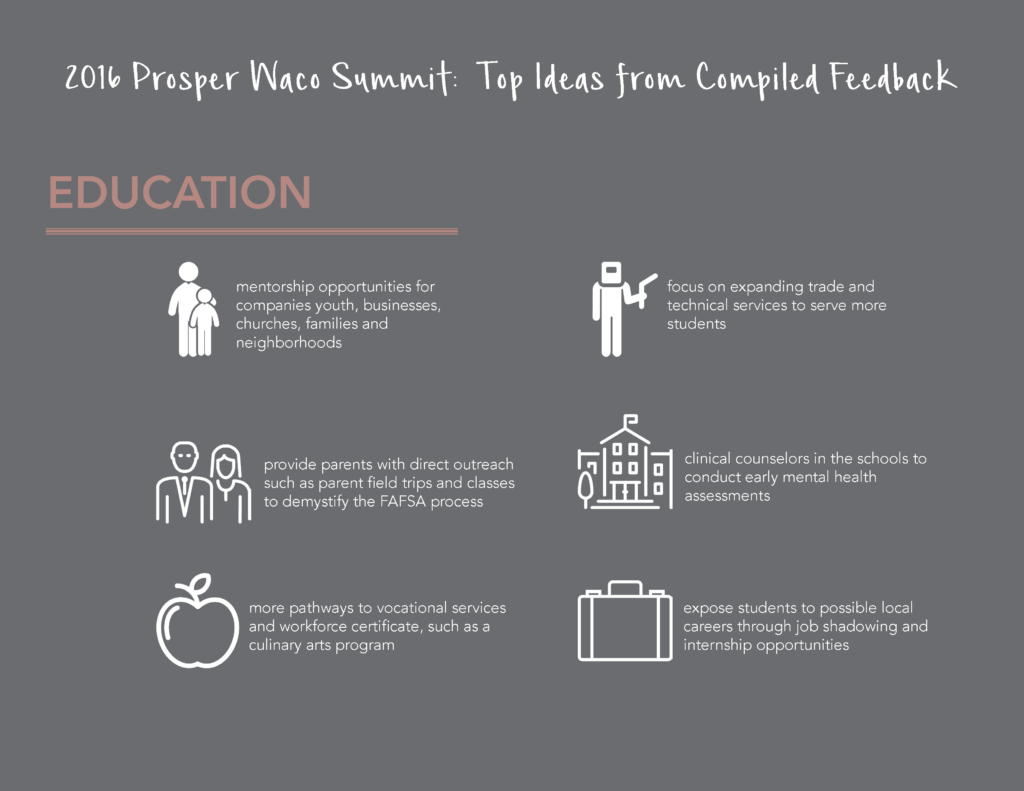
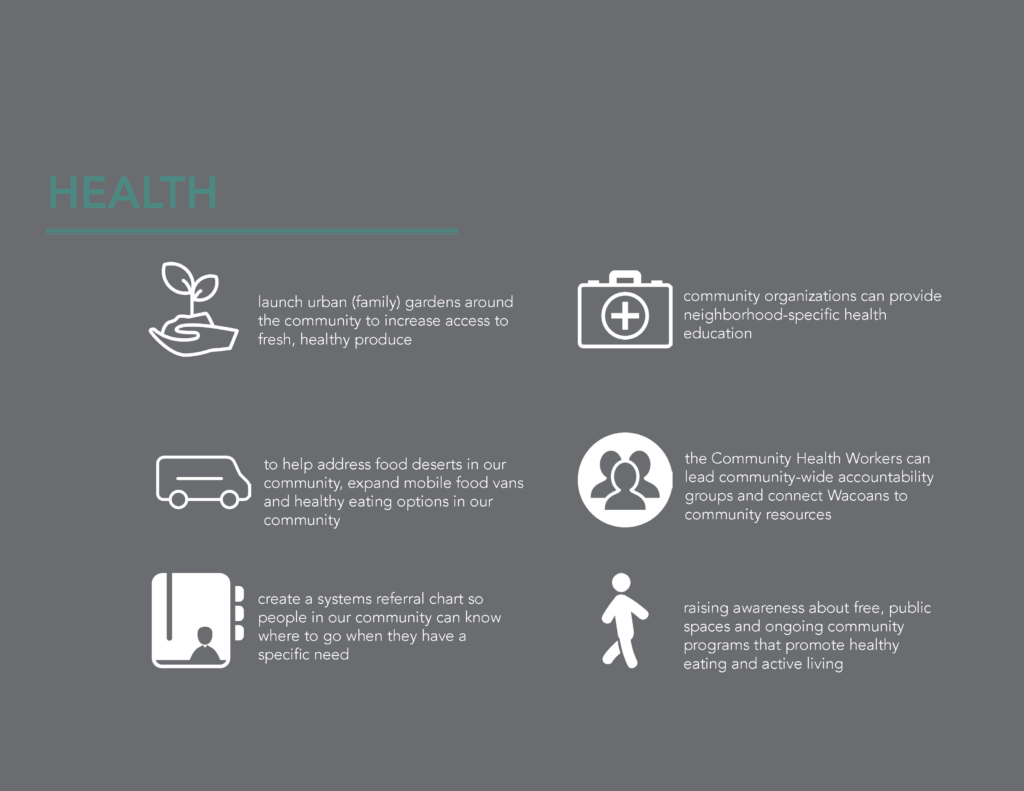
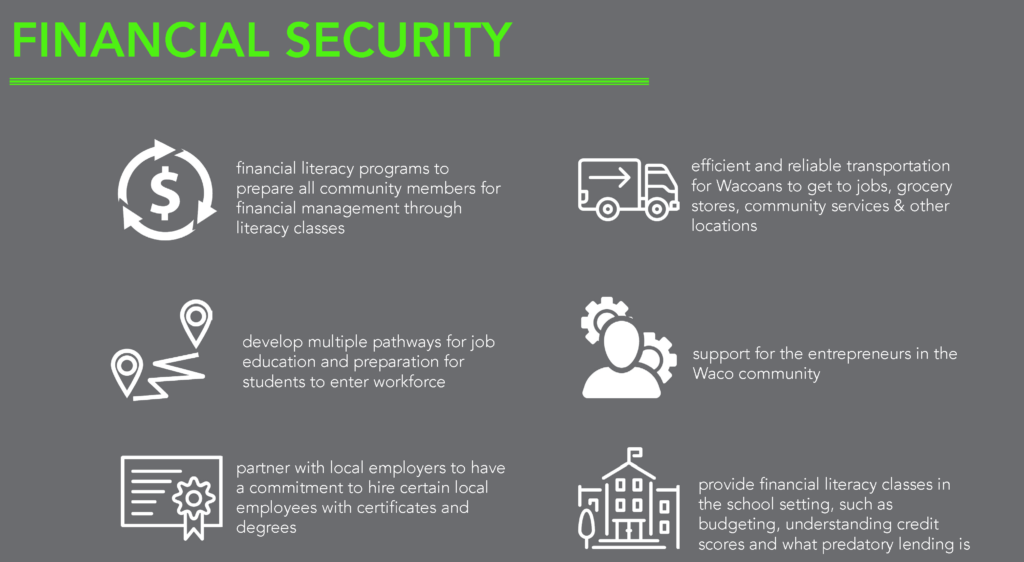
It is important to remember that the above solutions weren’t the only solutions people identified! With more than 500 community members identifying solutions, there were some solutions that appeared across all three rooms, which we captured in the above diagrams.
So the burning question remains…what will be done with this feedback?
Post the Summit, all three Steering Committees met to debrief about the event. During the meetings, committee members reviewed a document that captured all of the feedback, along with a separate document that had solutions that were specific to Education, Health and Financial Security. Some of the solutions crossed one or more strand of the initiative, which furthers the notion that the three aims of the initiative are interconnected.
After having small table discussions, the floor opened up for discussion around what support will be needed from the community to implement some of the solutions identified. Steering Committee members identified bringing other partners to the table, funding and learning more about existing programs in the Waco community as different types of support that would be needed. The feedback captured at the Summit will also be used to inform the work of the working groups by connecting what the community has identified as a solution to the work that is being implemented within the initiative.
We will also utilize the community’s feedback to help inform the work of our Community Engagement Council. During the house meetings the council hosts, they ask for thoughts and perspectives about the solutions identified during the Summit. The Council will continue to ask community members about their personal ideas and solutions to reach the community’s goals by 2020.
We understand not everyone was able to come to the Summit and voice their thoughts, ideas and solutions, which is why we welcome (and strongly encourage!) you to send us your thoughts by contacting us via email community@prosperwaco.org or calling 254-741-0081.
As always, this work is driven forward by the hard work of our community and there is always an open door for you to become involved and share your thoughts. If you’d like to become involved, email Jillian or call 254-741-0081.
 Christina Helmick is the director of communication at Prosper Waco. She is a recent graduate of Baylor University with a BA in Journalism, Public Relations & New Media. Originally she is from Washington, D.C., but has stayed in Waco post-graduation. She is an active mentor at J.H. Hines Elementary School, enjoys spending time with her family and watching Baylor football. Sic ’em Bears!
Christina Helmick is the director of communication at Prosper Waco. She is a recent graduate of Baylor University with a BA in Journalism, Public Relations & New Media. Originally she is from Washington, D.C., but has stayed in Waco post-graduation. She is an active mentor at J.H. Hines Elementary School, enjoys spending time with her family and watching Baylor football. Sic ’em Bears!
The Act Locally Waco blog publishes posts with a connection to these aspirations for Waco. If you are interested in writing for the Act Locally Waco Blog, please email ashleyt@actlocallywaco.org for more information.
By Liz Ligawa
For a long time, I adhered to a belief system which denied a connection between personal experiences and collective realities. The individualism in which my upbringing was brined did not fully prepare me to dignify the personal realities of others. I filed the stories of others as exceptions to the truths I already held…well, that was until I began to realize how much the stories I dismissed shared similar characteristics, outcomes, properties, etc. So, I began to wonder, “Could my estimations be wrong?” Thankfully, my novice perspectives were challenged, and I grew to appreciate how the truth of individual experience sheds light on systemic or, collective realities. It is a good thing this transformation occurred before I found myself in social work as a community practitioner.
So, here I am. I joined the Prosper Waco team as the Director of Community Engagement on August 1st, and I am grateful for the strong ways my theological, and social work training prepared me to understand, and affect change in systems which can function to oppress, or marginalize- even when those are not the intended consequences. If you cannot tell, advocacy is my strong suit.
By now, you might be wondering: “What does this post have to do with its title?” Well, it is a little embarrassing to admit, but even with one month at the organization under my belt, the hardest question for me to answer is still, “What is Prosper Waco?” Now, now…before you encourage my boss to consider replacing me with someone else with greater acumen, let me just say, this is not an easy question to answer. Ask my boss.
One of the reasons I think I have had a hard time putting Prosper Waco into a more familiar context (even for myself) is that it is an organization which has philanthropic roots, but colloquial branches. Let me explain what I mean. Philanthropy, or its Greek beginnings, φιλανθρώπως, adds up to acting humanely, kindly, or promoting the welfare of others. Although the activities of Prosper Waco are philanthropic in the sense that they are driven to promote others’ welfare, the initiative does not fit a popular interpretation of philanthropy- one that has a monetary expression of benevolence. Instead, it operates, philanthropically, through collaboration among structures (organizations, companies, institutions, etc.) which already exist, and are familiar to the local community.
So, what does this have to do with the innkeeper? Well, in the parable of the Good Samaritan, there seems to be just one hero; or we think of the parable with our focus narrowed to just one helpful way to respond. But do we limit the good we can do by only filling the role of the Samaritan? In saying that, I realize there are several layers to this story. There are strong themes to be mined about the culture, biases, and social context- but that’s a study for another time. What I am curious about, however, is how our view of this narrative shapes, and informs our perspective on altruism. Do narratives like the Good Samaritan encourage altruistic behavior? I am not yet convinced.
Personally, I feel that the parable is more of a “calling out” than it is a “calling to”, but I also cannot ignore its utility in the conversations around who receives our help. However, what I think is important to pay attention to is the emphasis, and in my opinion, over-emphasis on individual efforts towards help. I wonder if we are less-likely to help if we feel like we are the only ones that can help. And if we approach helping others with the idea that it is all up to our individual efforts, how does that influence our interactions with our neighbor, and what do we miss by not seeing how others are also helping?
What I see when I look at this parable is philanthropy administered through collaboration, trust, relationship, and hope. I see collaboration because after the Samaritan placed the man on his donkey, he did not take him home. He took him to the inn. I see trust because when the Samaritan arrived at the inn, he did not stay with the dying man, but he entrusted him to the care of the Innkeeper. I see relationship because the Samaritan informed the Innkeeper that he would pay for additional costs on his return, and the Innkeeper agreed. I see hope because the Samaritan and the Innkeeper had to feel that their combined efforts would make a difference in the life they had encountered.
Promoting the welfare of others takes this type of attention…collaboration, trust, relationship, and hope. The dying man received help from what was already existing. We have a full cast of characters in our community. We have the wounded. We have those who tend to help in individual ways; but since they become easily overwhelmed with work that requires partnership, they go the other way if they can’t accomplish it alone. Most importantly, though, we also have those who are interested in what good we can to together. No, we do not adhere to the single story of the Samaritan being the only hero. We gladly accept the role of the Innkeeper.
 Elizabeth Ligawa is a recent graduate from Truett Theological Seminary, and the Diana R. Garland School of Social Work, earning both her Master of Divinity, and Master of Social Work. Though her prized role is being a mother to her dear son, Elijah, Liz has a love for encouraging people to come together in ways that engender healthy communities. Her role as the Director of Community Engagement at Prosper Waco allows her the room to work in and among the many faces of her beloved Waco community. She may be reached at liz@prosperwaco.org.
Elizabeth Ligawa is a recent graduate from Truett Theological Seminary, and the Diana R. Garland School of Social Work, earning both her Master of Divinity, and Master of Social Work. Though her prized role is being a mother to her dear son, Elijah, Liz has a love for encouraging people to come together in ways that engender healthy communities. Her role as the Director of Community Engagement at Prosper Waco allows her the room to work in and among the many faces of her beloved Waco community. She may be reached at liz@prosperwaco.org.
The Act Locally Waco blog publishes posts with a connection to these Aspirations for Waco. If you are interested in writing for the Act Locally Waco Blog, please email ashleyt@actlocallywaco.org for more information.
By Christina Helmick
It has been about a year and a half since Prosper Waco hosted the Inaugural Event that drew more than 400 community members together to discuss the issues the community wanted to prioritize when the Prosper Waco initiative kicked off.
In September of this year, Prosper Waco is hosting its Annual Summit Event. It will be an opportunity for our community to come together to celebrate the progress we’ve made since the initiative kicked off in January of 2015 and to have integrated conversations around other issues that our community wants to undertake to work on in the future. Below is a quick outline of how the Summit will flow this year:
- Opening Session: this will be a chance for our community to celebrate the progress that has been made since the initiative kicked off in January of 2015. As the staff, we really want to celebrate the hard work that has been (and is being!) done in our community. This initiative wouldn’t move forward without the will of cross-sector community partners, which is why we strongly believe in having a celebration of the successes in the opening session!
Prosper Waco History: A brief history of the Prosper Waco initiative will be given during the opening session so all attendees can enter the integrated conversations with the background knowledge of the extensive community work the Prosper Waco initiative was built upon.
- Integrated Conversations: Many of your attended Prosper Waco’s Inaugural Event in February 2015, where education, health and financial security were split into different rooms to be able to dive deep into specific issues within those three impact areas. This year, we are taking a slightly different approach. As staff, we have heard from all levels of the community and involvement in the initiative that people who are involved in education want to learn about what is being in health and financial security, those involved in health want to learn about education and financial security….you get the idea. Community members want to know about what is being done in the areas they don’t work in or attend meetings in. By having integrated conversations with perspectives from education, health and financial security at the same table, all will be able to talk about issues our community wants to undertake with the feedback from all areas the Prosper Waco initiative is focused on. Keep reading to find out who the facilitators will be!
- Closing Session: The closing session will be a feature a dance performance from the well-known, local dance group Miriam’s Army! We are so thrilled to be working with Restoration Haven to have these talented girls perform a tap dance routine for Summit attendees. After the performance, guests will enjoy delicious food from none other than George’s Restaurant! To close the event, Dr. Tyrone Tanner will talk with Summit attendees about how systematic change happens through collaboration and partnership—exactly what is happening in the Waco community! His energizing talk will leave us all ready to head into to the new year ready for more collaboration and hard work!
At this year’s event, we will have three expert facilitators in each of the rooms to help guide the framework of the conversations. We believe having third-party facilitators will allow all members of the community—including the Steering Committee and Work Group Chairs—to have the opportunity to listen to community feedback and think strategically about how community partners can tackle certain issues as it relates to education, health and financial security. Click the links to learn more about the facilitators: Dr. Larry Hill, Dr. Tyrone Tanner and Dr. Luis Torres.
This event is truly created with the community in mind. We want each person, whether they have been involved from this initiative from the beginning or just heard about it through our Fox 44 News PSA, to know they are encouraged to come to this event!
It’s very easy to register! You can give us a call at 254-741-0081, sign up by clicking this link or send me an email at Christina@prosperwaco.org.
If you have any other questions, comments or want more information, don’t hesitate to reach out to me! I’m so excited for this event and to hear the feedback from each of you at this event about what other issues our community wants to undertake.
In the wise words of Henry Ford, “Coming together is a beginning; keeping together is progress; working together is success.”
Christina Helmick is the director of communication at Prosper Waco. She is a recent graduate of Baylor University with a BA in Journalism, Public Relations & New Media. Originally she is from Washington, D.C., but has stayed in Waco post-graduation. She is an active mentor at J.H. Hines Elementary School, enjoys spending time with her family and watching Baylor football. Sic ’em Bears!
the director of communication at Prosper Waco. She is a recent graduate of Baylor University with a BA in Journalism, Public Relations & New Media. Originally she is from Washington, D.C., but has stayed in Waco post-graduation. She is an active mentor at J.H. Hines Elementary School, enjoys spending time with her family and watching Baylor football. Sic ’em Bears!
The Act Locally Waco blog publishes posts with a connection to these aspirations for Waco. If you are interested in writing for the Act Locally Waco Blog, please email ashleyt@actlocallywaco.org for more information.
By Christina Helmick
When people first learn that I’ve lived all around the world, their immediate question is “why Waco?” I’ve really come to love answering that question.
Here are a few things you should know about me:
 I’m a military child (GO ARMY! BEAT NAVY!)
I’m a military child (GO ARMY! BEAT NAVY!)- I’ve moved more than 12 times in my life (before college)
- I lived in Italy for two years during high school
- My dad served three tours in Iraq
- Waco is the place I’ve lived longest in my life (going on six years!)
All of that to say….I’m an expert packer.
Some people cringe at the idea of moving so often; I wouldn’t change a thing about how I grew up. I have met dynamic people and learned about different cultures first hand. I became the outgoing person I am today through the hundreds of “new kid ice breaker” games I’ve had to play. I also got a chance to live in different cities, ranging from Fort Riley, Kansas, with a population of a little over 8.000 to Arlington, Virginia, with a population close to 400,000 people. Each city opened my eyes to how the world works, and I learned to love a city for the unique experiences it has to offer.
Being a recent Baylor alumna, I enjoyed the Waco community while I was in school. I got involved in a local church and gained insights about Waco from community members that have lived in Waco their entire lives. I knew after I graduated from Baylor I wanted to stay in Waco. That sentiment is becoming more and more common. Many of my sorority sisters are looking for jobs in Waco so they can move back. More and more recent college graduates are wanting to stay in Waco and forego that enticing Dallas-type salary because the quality of life is better in Waco.
Waco embodies what I believe to be an up-and-coming city. It has the nightlife, the young professional environment, great education institutions, a culture of collaboration between community organizations and a thriving downtown area. Our community does have certain issues to work on together, which are being addressed through strategic conversations between community partners within the Prosper Waco initiative.
I believe in this town and I hope you do, too! To learn more about the efforts our community is taking to address the issue of increasing education, health and financial security, visit www.prosperwaco.org. You can also register for prosper Waco’s Annual Summit Event, which will be held on Monday, Sept. 19 from 4:00-8:00 p.m. at the Waco Convention Center. The Summit will be an opportunity for our community to come together to celebrate the progress of the initiative in the last year and discuss the vision for the initiative moving forward. Dinner and childcare will be provided for Summit attendees. Here is the link to register!
Christina Helmick is the director of communication at Prosper Waco. She is a recent graduate of Baylor University with a BA in Journalism, Public Relations & New Media. Originally she is from Washington, D.C., but has stayed in Waco post-graduation. She is an active mentor at J.H. Hines Elementary School, enjoys spending time with her family and watching Baylor football. Sic ’em Bears!
the director of communication at Prosper Waco. She is a recent graduate of Baylor University with a BA in Journalism, Public Relations & New Media. Originally she is from Washington, D.C., but has stayed in Waco post-graduation. She is an active mentor at J.H. Hines Elementary School, enjoys spending time with her family and watching Baylor football. Sic ’em Bears!
The Act Locally Waco blog publishes posts with a connection to these aspirations for Waco. If you are interested in writing for the Act Locally Waco Blog, please email ashleyt@actlocallywaco.org for more information.
By Brittany Fitz-Chapman
Data doesn’t have to be scary or overwhelming. If you think about it, you have been using data your entire life to assess your well-being. For example, for every assignment you completed in school you were awarded a grade. At the end of high school, you were given your class rank based on your grade point average. When you feel sick, you take your temperature. Data has been informing your decision making process for a long time. You can use data at a community-level, as well. Data enables us to assess the well-being of our community and allows us to measure the impact programs and organizations are having.
Prosper Waco has been tasked with monitoring the health and well-being of our community through a series of data points, or what data people call “indicators.” Just like changes in body temperature may signal that you are getting sick, changes in community-level indicators suggest how healthy we are as a community.
When you are sick, your first reaction is to treat the symptoms, right? Let’s say you have a stuffy nose from allergies. You will go to H-E-B, use some Vicks rub and hope you get better. But, to cure the stuffy nose from allergies, you’ll need to go to your doctor and get allergy medicine. Prosper Waco community partners, organizations, community members and all others involved in the community-wide initiative ultimately want to treat the causes, not just the symptoms of our community’s health. The indicators we monitor allow our steering communities, working groups and community partners to treat the causes.
 For example, community members, organizations and leaders in Waco decided to make school readiness a priority, and the Prosper Waco Education Steering Committee developed a measurable goal for our community—to increase the percentage of Kindergarten-ready students by 50 percent by 2020. The working group has collaboratively discussed different projects, programs and initiatives they can all rally behind to help address this goal. One initiative community partners are rallying behind is Vroom. Vroom is an app that you can download on your smartphone, tablet (be sure to select “iPhone-only” apps!), or computer that provides daily, age-appropriate brain building activities adults can do with children ages 0-5 to help prepare them for Kindergarten. Each activity is paired with an explanation of the science behind the activity, allowing the adult to understand how that specific activity is developing the brain of the child.
For example, community members, organizations and leaders in Waco decided to make school readiness a priority, and the Prosper Waco Education Steering Committee developed a measurable goal for our community—to increase the percentage of Kindergarten-ready students by 50 percent by 2020. The working group has collaboratively discussed different projects, programs and initiatives they can all rally behind to help address this goal. One initiative community partners are rallying behind is Vroom. Vroom is an app that you can download on your smartphone, tablet (be sure to select “iPhone-only” apps!), or computer that provides daily, age-appropriate brain building activities adults can do with children ages 0-5 to help prepare them for Kindergarten. Each activity is paired with an explanation of the science behind the activity, allowing the adult to understand how that specific activity is developing the brain of the child.
Within the Prosper Waco working group that is focused on Kindergarten readiness, affiliate organizations have been collaborating and talking about other ways they can all work together to help create a culture of family engagement that prepares children to thrive when they enter the classroom. One example is a partnership between Waco ISD and the Mayborn Museum. They are developing a free Science Night for the children and families in our community. This Science Night will allow families to interact with their children at the museum, discuss the different exhibits and experience everything the museum has to offer! Using data from the school readiness monitoring tool, WISD and the Mayborn Museum can tailor the educational content of these nights, and they can use the data to help target their efforts on school campuses that may be struggling in the science content area.
The Prosper Waco initiative tracks indicators around our three impact areas – education, health and financial security. To find out more about how our community is doing, read our 2015 Greater Waco Community Indicators Scorecard and attend our 2016 Summit Event in September where you will get a copy of our Community Baseline Report. I look forward to seeing all of you and would love to talk data with you!
 Brittany Fitz-Chapman works at Prosper Waco as the Director of Data and Research. She is a graduate of Baylor University. She holds two master’s degrees and is pursuing her PhD in Sociology at Baylor. She has engaged in community research in Waco and has published professional articles about what makes communities strong. She enjoys exploring Waco with her husband and their two puppies!
Brittany Fitz-Chapman works at Prosper Waco as the Director of Data and Research. She is a graduate of Baylor University. She holds two master’s degrees and is pursuing her PhD in Sociology at Baylor. She has engaged in community research in Waco and has published professional articles about what makes communities strong. She enjoys exploring Waco with her husband and their two puppies!
The Act Locally Waco blog publishes posts with a connection to these aspirations for Waco. If you are interested in writing for the Act Locally Waco Blog, please email ashleyt@actlocallywaco.org for more information.
By Christina Helmick
Have you heard the saying “there is an app for that?” I have an app that automatically texts people when I am in a certain area, another app that keeps track of the steps I’ve taken, and an app that organizes my grocery list based upon food categories. What about an app that provides daily activities for adults to do with children to help prepare them for Kindergarten? Well, there is an app for that too!
 The Prosper Waco Kindergarten Readiness work group, along with other Prosper Waco community partners like the Cameron Park Zoo and the Mayborn Museum, are promoting a free parenting tool called Vroom. Vroom, which you can download on any smartphone, tablet or computer, provides you with daily, age-appropriate brain building activities to do with children ages 0 to 5. Each activity comes with science-based background information that allows adults to understand how that specific activity is building the brain development of the child. To download the app, go to the App Store and search for “Vroom” or “Daily Vroom.”
The Prosper Waco Kindergarten Readiness work group, along with other Prosper Waco community partners like the Cameron Park Zoo and the Mayborn Museum, are promoting a free parenting tool called Vroom. Vroom, which you can download on any smartphone, tablet or computer, provides you with daily, age-appropriate brain building activities to do with children ages 0 to 5. Each activity comes with science-based background information that allows adults to understand how that specific activity is building the brain development of the child. To download the app, go to the App Store and search for “Vroom” or “Daily Vroom.”
If there is someone you know that would enjoy practicing brain building with their infant, toddler or preschooler and doesn’t have access to the Internet, give us a call at 254-741-0081 to receive physical copies of the Vroom activities.
Depending upon if you are an early childhood care provider, a community organization or a community member who wants to raise awareness about Kindergarten Readiness, there are different ways you can promote Vroom.
 For example, if you are an early childhood care provider or an organization that directly deals with children ages 0 to 5 and their families, you can distribute information to your families about Vroom and hang posters around your facility! If you are a community organization like the City of Waco, you can hang posters around your workplace and include a Vroom flyer in your welcome packets to new hires. If you want to help promote Vroom on an individual level, bring Vroom flyers with you to meetings you attend and direct people to the Vroom tab on the Prosper Waco website so they can learn more about the app! To learn more ways to help promote Vroom within our community and the organizations working together to promote the app, visit our website.
For example, if you are an early childhood care provider or an organization that directly deals with children ages 0 to 5 and their families, you can distribute information to your families about Vroom and hang posters around your facility! If you are a community organization like the City of Waco, you can hang posters around your workplace and include a Vroom flyer in your welcome packets to new hires. If you want to help promote Vroom on an individual level, bring Vroom flyers with you to meetings you attend and direct people to the Vroom tab on the Prosper Waco website so they can learn more about the app! To learn more ways to help promote Vroom within our community and the organizations working together to promote the app, visit our website.
Everyone in our community can use #Vroom254 to encourage brain building activities!
This free parenting tool is one element to addressing the Prosper Waco Kindergarten Readiness goal of increasing the percentage of Kindergarten ready students by 50 percent by 2020.
Don’t hesitate to reach out to Christina Helmick [254-741-0081] with questions about Vroom or how you can help promote the free parenting tool!
 Christina Helmick is the director of communication at Prosper Waco. She is a recent graduate of Baylor University with a BA in Journalism, Public Relations & New Media. Originally she is from Washington, D.C., but has stayed in Waco post-graduation. She is an active mentor at J.H. Hines Elementary School, enjoys spending time with her family and watching Baylor football. Sic ’em Bears!
Christina Helmick is the director of communication at Prosper Waco. She is a recent graduate of Baylor University with a BA in Journalism, Public Relations & New Media. Originally she is from Washington, D.C., but has stayed in Waco post-graduation. She is an active mentor at J.H. Hines Elementary School, enjoys spending time with her family and watching Baylor football. Sic ’em Bears!
The Act Locally Waco blog publishes posts with a connection to these aspirations for Waco. If you are interested in writing for the Act Locally Waco Blog, please email ashleyt@actlocallywaco.org for more information.
For more about Vroom see this recent Prosper Waco talk show that focuses on the app and brain building…
By Christina Helmick
Recently, we’ve been getting asked how people can become involved in the Prosper Waco initiative if they can’t attend meetings or meetings aren’t their thing. That’s a good question. We tend to focus on the many meetings that occur within the Prosper Waco initiative, sometimes we don’t communicate clearly enough that there are a plethora of ways to become involved—from subscribing to our newsletter to volunteering your time to help prepare community members to become “job ready.”
Below are five specific opportunities for you to choose to become engaged in the Prosper Waco initiative. These of course are not all of the ways, but just a few to get started.
 Engage the community: Community engagement is a two-way conversation! If you are a part of an organization in town, connect with the Prosper Waco Community Engagement Council to learn how the Prosper Waco initiative aligns with your organization. If you are a community member and you want to join the conversation about the Prosper Waco initiative, host or attend a house meeting with the Community Engagement Council. A house meeting doesn’t have to be at your house—it can be anywhere!
Engage the community: Community engagement is a two-way conversation! If you are a part of an organization in town, connect with the Prosper Waco Community Engagement Council to learn how the Prosper Waco initiative aligns with your organization. If you are a community member and you want to join the conversation about the Prosper Waco initiative, host or attend a house meeting with the Community Engagement Council. A house meeting doesn’t have to be at your house—it can be anywhere!
 Become a mentor: The Mentor Coalition is comprised of various organizations in our community who provide mentoring to Waco youth. There are many different ways to mentor in our community. Check out the list! You may find the perfect match for your availability, your interests and the age person you would like to mentor. LEAD, Communities in Schools and Big Brothers Big Sisters are just a few of the organizations in the coalition.
Become a mentor: The Mentor Coalition is comprised of various organizations in our community who provide mentoring to Waco youth. There are many different ways to mentor in our community. Check out the list! You may find the perfect match for your availability, your interests and the age person you would like to mentor. LEAD, Communities in Schools and Big Brothers Big Sisters are just a few of the organizations in the coalition.
 Support job readiness programs: In our community, we have many organizations working hard to help Waco residents acquire the skills necessary to get and keep a job. Examples of these organizations include HOT Goodwill Industries, Christian Men’s Job Corps, Christian Women’s Job Corp and the newly created Esther’s Closet.
Support job readiness programs: In our community, we have many organizations working hard to help Waco residents acquire the skills necessary to get and keep a job. Examples of these organizations include HOT Goodwill Industries, Christian Men’s Job Corps, Christian Women’s Job Corp and the newly created Esther’s Closet.
 Subscribe to our newsletter: Subscribing to the Prosper Waco newsletter will ensure you are kept abreast of the collaborative efforts that are ongoing in our community. The newsletters arrive on the first Monday of every month. Also, follow us on our Facebook and Twitter pages to receive daily updates on the initiative!
Subscribe to our newsletter: Subscribing to the Prosper Waco newsletter will ensure you are kept abreast of the collaborative efforts that are ongoing in our community. The newsletters arrive on the first Monday of every month. Also, follow us on our Facebook and Twitter pages to receive daily updates on the initiative!
 Of course if you DO want to Attend a meeting you are certainly invited! At either the Steering Committee level or the Working Group level, you can join the ongoing collaborative conversations about strategies and projects that will help address the goals of the initiative. Check the “Events” tab on our website for meeting times, dates and locations.
Of course if you DO want to Attend a meeting you are certainly invited! At either the Steering Committee level or the Working Group level, you can join the ongoing collaborative conversations about strategies and projects that will help address the goals of the initiative. Check the “Events” tab on our website for meeting times, dates and locations.
As I mentioned before, these are just a few ways to get involved in the Prosper Waco initiative. If you have any interest in these opportunities, or want to learn more about them, send me an email and I’d be happy to connect you.
Getting involved with one or more of the aforementioned ways will directly contribute to moving the initiative forward. Our community is working hard to collectively improve the education, health and financial security of each person in our community. There isn’t a silver bullet to alleviating poverty in our community, but with your help, positive change not only can, but will, happen in our community.
 Christina Helmick is the director of communication at Prosper Waco. She is a recent graduate of Baylor University with a BA in Journalism, Public Relations & New Media. Originally she is from Washington, D.C., but has stayed in Waco post-graduation. She is an active mentor at J.H. Hines Elementary School, enjoys spending time with her family and watching Baylor football. Sic ’em Bears!
Christina Helmick is the director of communication at Prosper Waco. She is a recent graduate of Baylor University with a BA in Journalism, Public Relations & New Media. Originally she is from Washington, D.C., but has stayed in Waco post-graduation. She is an active mentor at J.H. Hines Elementary School, enjoys spending time with her family and watching Baylor football. Sic ’em Bears!
The Act Locally Waco blog publishes posts with a connection to these aspirations for Waco. If you are interested in writing for the Act Locally Waco Blog, please email ashleyt@actlocallywaco.org for more information.

